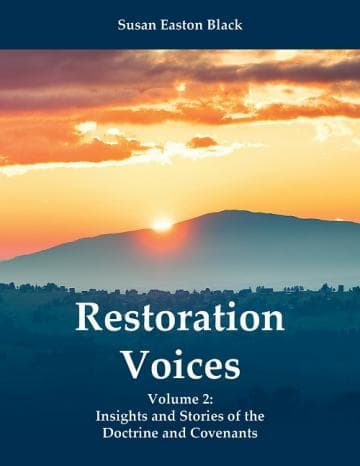Book
140 Chapters

Three months after the foundational meeting of the Church, the Prophet Joseph Smith received a revelation for his wife, Emma. In the revelation Emma was told, “The office of thy calling shall be for a comfort unto my servant, Joseph Smith, Jun., thy husband” (D&C 25:5). As a wife she was to use “consoling words, in the spirit of meekness” and to cleave to Joseph and to “go with him at the time of his going and be unto him for a scribe” (D&C 25:5–6). For faithfully fulfilling her role as a wife, Emma was promised that her “husband shall support thee in the church” (D&C 25:9).
Emma needed Joseph’s support, for she was told by revelation “to expound the scriptures, exhort the Church, and write, learn and select sacred hymns” (D&C 25:7, 8, 11). Why was Emma called to “select hymns”? She was musically inclined. William Holmes Walker wrote, “I arrived at [Joseph’s] house about nine o’clock, just as his family was singing, before the accustomed evening prayer. [Joseph’s] wife Emma, leading in the singing. I thought I had never heard such a sweet, heavenly music before.”[1]
At a meeting of the Kirtland High Council and the Presidency of the Church held on September 14, 1835—the very same meeting in which Joseph Smith Sr. was called to pronounce patriarchal blessings and Oliver Cowdery was called to be a Church recorder— “it was . . . further decided that Sister Emma Smith proceed to make a selection of Sacred Hymns, according to the revelation; and that President W. W. Phelps be appointed to revise and arrange them for printing.”[2] Emma fulfilled the assignment, although it is difficult to say where Emma’s selection of hymns ended and Phelps’s began. With the help of Phelps, Emma compiled a pocket-sized hymnal titled A Collection of Sacred Hymns for the Church of the Latter Day Saints. The hymnal contains ninety hymns, the first being “Know This That Every Soul Is Free.” Thirty-four of the selected hymns were authored by Church members, twenty-six contributed by William W. Phelps. His most famous hymn, titled “Hosanna to God and the Lamb,” is better known by the first line, “The Spirit of God like a fire is burning.” At least fifty hymns were borrowed or rewritten Protestant songs.
On October 27, 1839, “the High Council of Nauvoo voted . . . that Sister Emma Smith select and publish a [second] hymn-book for the use of the Church.”[3] Emma compiled a second hymnal in 1841 which included 304 hymns with suggested tempos.
[1] William Holmes Walker, The Life Incidents and Travels of Elder William Holmes Walker and his Association with Joseph Smith, the Prophet (n.p.: Elizabeth Jane Walker Piepgrass, 1943), 8.
[2] Smith, History of the Church, 2:273.
[3] Smith, History of the Church, 4:1–18.
Book
140 Chapters
Items in the BMC Archive are made publicly available for non-commercial, private use. Inclusion within the BMC Archive does not imply endorsement. Items do not represent the official views of The Church of Jesus Christ of Latter-day Saints or of Book of Mormon Central.